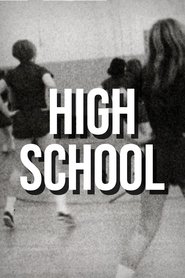High School is critical of the school's approach to race, class, sex, gender, authority, the body etc., but does it not slightly undermine itself with those handful of rather leering shots at the female students' legs?
What [Wiseman] discovers [in] this cloistered academic setting, is a microcosm for the cultural warfare happening all over America in the late ’60s. High School gradually morphs into a quiet depiction of clashing generational values, with the instructors as torchbearers for a general worldview on the wane and the students as the voices of a new country being born in their image.
— A. A. Dowd (AV Club)
The movie begins with a teacher starting her class by reading the “thought for the day” (“What I do today is going to change my life tomorrow”) and a Spanish class learning the word “existentialism” by rote. The “thought for the day” is banal, but it is also appalling, for we realize that it is the school, not the students themselves, that is trying to change their lives. As Wiseman’s joke about existentialism suggests, the students are studying freedom in a way that will discourage them from being free.[…]
A handsome woman with a fine head of white hair, reads to the faculty a letter from a recent graduate, a boy expecting to die in Vietnam. “Don’t worry about me,” the boy writes. “I’m just a body doing a job.” [The] boy, in words of self-negation that the principal applauds, has surrendered to the school even the meaning of his own death. High School is a sinister and very shrewd portrait of the American pursuit of mediocrity, a film of almost Nabokovian wit.
— David Denby (New York Review of Books)
High School, in addition to its other considerable merits, should lay to rest once and for all this mystique of "interesting personalities" in direct-cinema films. Cinema verité need be no more a performer's medium than the fiction film. Those situations where the subject is so fully occupied with other things that the camera's presence is forgotten are far outnumbered by times when nothing much is going on and we damn well know that people are trying to act as though the camera's presence isn't making any difference.[…]
What matters in a Wiseman film is not necessarily what people say to each other, but the tone in which they are speaking and the degree of emotion behind their words. Attitudes rather than factual information are the substantive content of his films.
[…]
The idea of training (or indoctrinating) students to fit into the orderly processes of society might not be all that High School is about, but it is at least the guiding principle behind its structure. The film is concerned with the attitudes which the high school hopes to foster in its students and the all-pervasiveness of its philosophy, beyond classroom learning into matters of sexual relationships, competitiveness, dress habits, social graces, and roles within the family. If High School generates controversy, it should be on the level of whether these are the proper functions of education, and not about whether Wiseman has shown us a balanced picture. To say that the experience of going to high school is more than what is in the film, or that the film does not show a typical day for any student, is irrelevant. Wiseman presents a thesis which has to be argued on its own terms.
[…]
Unmistakable patterns emerge. [We] begin to notice how rarely we hear kids talking. The students are forced to be listeners, and what they are told starts sounding pretty much the same. "We're out to establish that you're a man and can take orders." "We're going to do in this school what the majority wants." "It's nice to be individualistic, but there are certain places to be individualistic." "The dictionary is the only place where success comes before work."
[…]
When a student tries to avoid a gym class by presenting a doctor's note, the zoom-in on the vice-principal's eyes just after he glares back and replies "We'll determine that" hints at a cold hatred which is made more terrifyingly revealing by this magnification of the military coldness in his eyes than by his actual words. It's frightening, but as at many other points in the film, we can't help but laugh in nervous recognition of such blatant displays of authoritarianism. Wiseman's almost freakish sense of humor, allowing us to laugh at boredom and repression, keeps High School from being a chamber of horrors
[…]
If there are villains in High School (or in any of Wiseman's films), they exist outside the film's milieu-in a general attitude in America which imposes a rigid, traditional philosophy on the administrators of its institutions. [Its] effectiveness stems from the interchangeability of individuals enacting their specific social roles, from ritual processes enforced by organizational relationships.
[…]
High School does more than imply that this kind of educational system leads to willing soldiers and spacemen. It leaves us doubting seriously whether America has the capability for altering its institutions to suit the shifting expectations and needs of those who are supposed to benefit by them. Judging from our readiness to police the world to defend our interests and travel to the moon loaded with plaques and political souvenirs, we have the insensitive, cruel institutions we deserve.
— Stephen Mamber (Film Quarterly)

